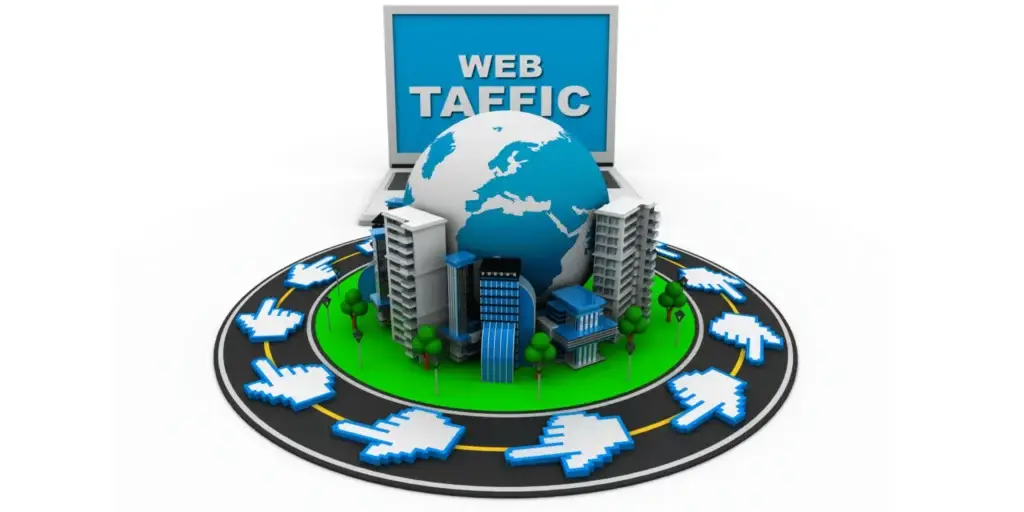Traffic bots have come a long way since their inception.
From simple scripts that generated fake clicks and traffic to advanced AI-powered bots that mimic human behavior, the evolution of traffic bots has been impressive. But what exactly are traffic bots, and why are they used?
In this blog post, we will delve into the basics of traffic bots, their history and evolution, the different types of traffic bots available, and how they are used for both good and bad purposes.
We will explore the potential risks and dangers of using traffic bots as well as their role in illicit activities such as click fraud and competitor advertising sabotage.
Lastly, we will discuss the future of traffic bots with advancements in AI technology and the use of proxies.
Join us as we explore the fascinating world of traffic bots.
The Basics of Traffic Bots
Transitioning from the previous heading, it’s essential to understand the basics of traffic bots. At their core, they are pieces of software designed to mimic human behavior on the internet. They are used to generate website traffic, click-through rates, and impressions.
In essence, they simulate activities that real users would typically generate. The primary goal of these bots is to help businesses improve their online presence by increasing the visibility of their websites and improving search engine rankings.
When we talk about traffic bots, we often refer to them as good or bad. However, it’s important to note that not all bots are created equal. Some are designed with genuine intentions, while others exist solely for illicit activities like click fraud or manipulation.
In the next few sections, we’ll delve deeper into the different types and their impact on online activity.
What are Traffic Bots?
Traffic bots are automated programs that can perform various tasks related to website traffic, such as generating views or clicks.
Traffic bots range from simple scripts to advanced AI-powered systems and can be used for legitimate and fraudulent purposes. It is crucial to use them ethically and with caution to avoid potential penalties or negative impacts on the website’s reputation.
History and Evolution of Traffic Bots
As the internet and search engines have evolved, so have traffic bots.
Early versions were simple scripts designed to generate fake internet traffic and manipulate search engine rankings. However, as algorithms became more sophisticated, these tactics became less effective.
This led to the development of more advanced software that utilized machine learning algorithms and AI to mimic human behavior and generate high-quality website traffic.
In order to increase their online visibility, marketers and website owners frequently use traffic bots today. They continue to evolve in complexity and sophistication, and their capabilities will likely increase with AI advancements.
Understanding the Purpose of Traffic Bots
In today’s digital age, websites are a primary interface for businesses to connect with customers. Therefore, it is essential to ensure that the website is functioning optimally.
Good bots can be an effective tool for testing website performance under heavy traffic. These mimic human behavior and generate website traffic, making it easier to analyze the site’s performance and address any issues. Additionally, they can help increase online visibility by improving search engine rankings or boosting organic traffic for marketing purposes.
However, using traffic bots ethically and responsibly is crucial to avoiding potential consequences. Some forms of bad bot activity may violate the terms of service or even be illegal in certain jurisdictions.
Understanding the purpose of using bots before deploying them on a website is essential. Simulating human traffic requires significant analytics data processing, which can be complex and challenging without prior knowledge.
Nonetheless, with increasing technological advancements in the field, it has become more accessible than ever before.
Types of Traffic Bots
Bots come in various types depending on their complexity and purpose. Simple bots are the most basic type, using scripts to simulate human behavior on a website. These can perform actions like clicking links or filling out forms but lack the sophistication of more advanced bots. Other types include:
- Shopping bots: Shoppers use these to identify deals, trends, and other metrics
- Spam bots: These are used to send advertisements to email addresses or flood chatrooms.
- Web scrapers: These are for automated data collection.
- Copyright bots: Scour the internet for copyright infringements.
- Web crawlers: Google uses these to organize and deliver search results.
- Search engine bots: These are SEO tools for improving Google Analytics.

Simple Traffic Bots
With the rise of the internet, simple traffic bots have become increasingly popular due to their ease of use and accessibility. They operate using basic scripts or macros that automate website visits and can be used for various purposes, including testing website performance or boosting traffic for marketing purposes.
However, it’s important to note that anti-bot measures often easily detect and block these bots. As a result, simple bots have evolved over time to become more sophisticated and harder to detect.

Advanced Traffic Bots
Advanced bots now use artificial intelligence and machine learning algorithms to simulate human behavior and interactions on websites. These highly sophisticated bots can navigate complex websites, solve CAPTCHAs, interact with chatbots, fill out forms, and make purchases.
The benefits of advanced traffic bots include more accurate website testing and performance analysis and the potential for optimizing online advertising campaigns. However, they can also be used for malicious activities such as DDoS attacks or click fraud. It is crucial to understand the capabilities and limitations of advanced bots in order to prevent their misuse.
The Good vs. The Bad
The world of bots is a double-edged sword with both positive and negative implications.
Benefits of Traffic Bots
Increasing website traffic and generating leads can be a challenging task for businesses. This is where bots come into play, providing benefits that extend beyond just driving non-human traffic. By automating repetitive tasks such as content distribution and link building, bots save time and resources for better use. Furthermore, by utilizing AI-powered bots, businesses can have a deeper understanding of user behavior patterns, which helps them tailor their strategies for maximum impact.
Using traffic bots ethically can help businesses improve search engine rankings and generate more conversions and revenue. It’s important to note that using them for malicious purposes, such as click fraud or spamming, can lead to serious consequences. As long as they are used responsibly, bots can be a potent tool for businesses looking to grow their online presence.
Risks and Dangers of Traffic Bots
The increasing popularity of traffic bots has not gone unnoticed by cybercriminals, who use them to carry out malicious activities.
One of the most significant risks associated with traffic bots is click fraud, which involves generating fake clicks on ads to drive up costs for advertisers. This can result in losses for both advertisers and publishers, leading to a decrease in trust in online advertising.
Additionally, bots can be used to conduct DDoS attacks, which can cause websites to go down and result in lost revenue and damaged reputations. Using bot detection software and monitoring website traffic regularly is important to avoid such risks.
How Traffic Bots are Used for Illicit Activities
The use of bad traffic bots for illicit activities poses a significant threat to website owners and businesses.
One of the most common forms of bad bot traffic is click fraud, which involves artificially inflating the number of clicks on ads or website links. This leads to wasted ad spend and negatively impacts the advertising ecosystem by disrupting fair competition among advertisers.
Another form of misuse is competitor advertising sabotage, where bots are used to increase a competitor’s advertising costs or decrease their ad performance.
Additionally, bots can be employed for influence manipulation and deception, such as promoting fake news or propaganda, which can have far-reaching consequences on public opinion and trust in institutions.
As AI-powered traffic bots become more sophisticated, it’s crucial to stay vigilant against their potential for misuse and take proactive measures to protect against these threats.
Click Fraud
Click fraud is a significant problem that can have serious financial implications for businesses. It occurs when bots generate fraudulent clicks to increase the revenue generated for the fraudster. These fraudulent clicks create a false impression of interest in a product or service, leading to increased advertising costs for the business owner.
Click fraud is difficult to detect and often goes unnoticed until it’s too late. Advanced analytics tools or anti-fraud technologies can help prevent this illegal activity and save businesses from suffering huge losses.
Competitor Advertising Sabotage
Businesses must be aware of the risks associated with competitor advertising sabotage, which can harm a competitor’s reputation and cause their advertising costs to skyrocket.
Advanced AI-powered bots can simulate visits to a competitor’s website, creating false impressions and depleting the budget.
Combating this sabotage requires businesses to invest in proper security measures, such as anti-fraud technology. Staying up-to-date on the latest traffic bot advancements can help businesses better detect and prevent these attacks.
By protecting themselves against competitor ad sabotage, businesses can safeguard their reputation and prevent unnecessary financial losses.
Influence Manipulation and Deception
With the rise of social media and online platforms, influence manipulation and deception have become a growing concern for businesses and individuals alike.
Bots can be used to create fake likes, comments, and followers, leading to an artificially inflated sense of popularity or influence. This can deceive consumers and damage a brand’s reputation.
Additionally, some bots are designed to post fake reviews or comments, which can mislead customers into making purchasing decisions based on false information.
As bot technology continues to advance, businesses and individuals must stay informed about the potential risks associated with these tools and take the necessary precautions to protect themselves from fraudulent activities.
The Future of Traffic Bots
As technology continues to advance, so do bot management solutions. The future of these bots looks to be one of increasing sophistication and complexity. With AI advancements, bots are becoming more intelligent and better at mimicking human behavior, making it harder to detect fraudulent activities.
Businesses and individuals must remain vigilant and aware of the potential risks of traffic bots. Implementing proper security measures and staying up-to-date on the latest developments in traffic bot technology is crucial to protecting yourself from potential attacks. As bots continue to evolve, it’s important to remember that staying informed is the first line of defense against their malicious use.
Increasing Sophistication and Complexity
As search algorithms and user behavior evolve, traffic bots become more sophisticated and complex. From simple scripts to advanced AI models, these bots can mimic human behavior, making them harder to detect. Modern bots can scroll, click, and fill out forms on websites like real users.
Advanced AI-powered bots use machine learning algorithms to adapt and improve their performance over time. However, as the sophistication of these bots increases, website owners must invest in reliable tools and strategies to protect their sites from malicious bot traffic.

AI Advancements and Impact on Traffic Bots
The need to keep up with changing search algorithms and user behavior drives bot sophistication and complexity. AI advancements have led to the development of more sophisticated traffic bots that can analyze data and adjust strategies in real-time.
These advanced AI-powered bots can help optimize website traffic, improve user engagement, and increase conversions. However, there are concerns about the ethical implications of using AI in traffic bots, such as fake engagement and manipulation of online behavior. As technology continues to evolve, it will be important to balance innovation with the responsible use of AI-powered traffic bots.
The Use of Proxies for Traffic Bots
The use of proxies is essential for bots to remain undetected and simulate human behavior. Proxies enable traffic bots to hide their IP addresses and distribute the web traffic across multiple locations, making it difficult to identify them as bots.
With advanced proxy management tools, switching and rotating proxies can be automated to ensure optimal performance. Moreover, high-quality residential proxies offer better success rates and improve the overall performance of traffic bots.
For instance, IPBurger Proxies provides reliable and secure residential proxies to help you achieve your desired website traffic goals.
Conclusion
In conclusion, traffic bots have evolved from simple scripts to advanced AI that can mimic human behavior and interact with websites more convincingly.
While bots have benefits, such as improving website traffic and engagement, they also have risks and dangers, such as click fraud and influence manipulation.
As the technology behind traffic bots continues to advance, businesses need to be aware of their use and potential impact on their online presence.
Proxy servers can add an extra layer of protection by masking the IP address of the bot.
To learn more about how proxies can help protect your online business, check out IPBurger’s proxies homepage.
FAQs
Are there any drawbacks to using a traffic bot?
Due to the fact that bot traffic is not real and does not reflect actual human engagement with the site, it can result in inaccurate website analytics data. Additionally, using a traffic bot may violate the terms of service of advertising platforms such as Google AdSense.
Are traffic bots legal?
The use of bots to artificially inflate session duration, page views, or engagement is considered unethical and may be against the terms of service of many websites and online platforms. Additionally, some forms of bot activity may be illegal, such as those that involve hacking, credential stuffing, or spreading malware.
Why do I have bot traffic?
Many things can cause bot traffic, including web scraping, automated tools or scripts, bot attacks, click fraud, botnet, or spamming. Bots can also be used for legitimate purposes, such as by search engine crawlers that index your site so it can appear in search results. However, excessive bot traffic can negatively impact your website’s performance and analytics data.



